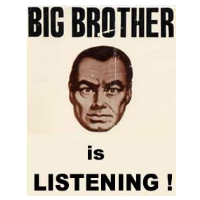Congress’ NSA Bulk Surveillance Reform Bill: Much Ado about Little

The USA Freedom Act, a bill passed out of committee last week which would limit the government’s ability to spy on Americans’ communications, would hardly put a crimp in the National Security Agency’s (NSA) surveillance practices.
The Freedom Act would stop most government collection of domestic calling metadata. The government would be limited to requesting from telecommunications companies information when there is a “reasonable, articulable suspicion” that a “specific selection term” is connected to international terrorism, according to an analysis by the Electronic Frontier Foundation.
But the bill doesn’t address data collection under Section 702 of the FISA Amendments Act, which allows the collection of the actual content of some communications, including that of Americans, and the collection of information from overseas calls.
“If this bill passes, the NSA will continue unaddressed surveillance programs and will secretly torture the English language to devise novel justifications for spying on Americans,” David Segal, executive director of Demand Progress, a group that has fought for more civil liberties, told The New York Times. “We won’t even know the details until a new whistleblower comes forward a decade or two from now.”
An amendment which would strengthen protections against backdoor surveillance such as that allowed under Section 702 has drawn significant support (pdf), but has been rejected, along with others. House Judiciary Committee Chair Rep. Bob Goodlatte (R-Virginia) and ranking member Rep. John Conyers (D-Michigan) have said the Freedom Act has been carefully crafted as a compromise and if it’s amended, it has no chance of getting a vote on the House floor. Its chance for success hinges on the expiration next month of authority for bulk data collection and those in the intelligence community want to ensure they still have some ability to spy on Americans.
The bill will probably pass the House, but its chances in the Senate are unclear, according to the Times. Senate Majority Leader Mitch McConnell (R-Kentucky) has stated his preference just to reauthorize the current programs. The American Civil Liberties Union wants the original legislation to expire with no substitute in the hopes of putting more restrictions on data gathering.
Still, the Freedom Act has drawn support—as better than nothing—from organizations such as the Electronic Frontier Foundation, Human Rights Watch and the Information Technology Industry Council.
-Steve Straehley
To Learn More:
Why the NSA Isn’t Howling Over Restrictions (by Peter Baker and David E. Sanger, New York Times)
Yesterday’s USA Freedom Markup: A Glimpse into the Fight to Reform Section 702 (by Nadia Kayyali, Electronic Freedom Foundation)
Letter of Support for the Poe-Lofgren Amendment to USA Freedom Act (pdf)
Bill to Halt NSA Warrantless Surveillance, Passed by House, Quietly Dropped before Going to Senate (by Steve Straehley, AllGov)
The Disturbing Clause not Covered by Proposed NSA Reform (by Noel Brinkerhoff, AllGov)
Declassified Document Confirms Obama Administration Lied about Internet Surveillance Program (by Noel Brinkerhoff, AllGov)
- Top Stories
- Unusual News
- Where is the Money Going?
- Controversies
- U.S. and the World
- Appointments and Resignations
- Latest News
- Trump Orders ICE and Border Patrol to Kill More Protestors
- Trump Renames National Football League National Trump League
- Trump to Stop Deportations If…
- Trump Denounces World Series
- What If China Invaded the United States?






Comments